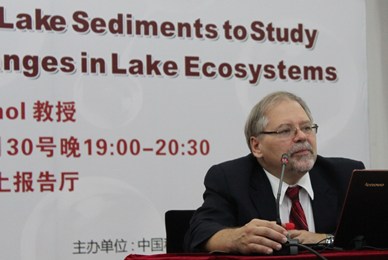Biology professor thrilled by international opportunities
February 11, 2013
Share
 John Smol (Biology) was the only Canadian awarded the prestigious Einstein Professorship from the Chinese Academy of Sciences last year.
John Smol (Biology) was the only Canadian awarded the prestigious Einstein Professorship from the Chinese Academy of Sciences last year.John Smol (Biology) is not wanting for places to go or things to do.
The Canada Research Chair in Environmental Change travelled to 10 countries last year giving lectures, teaching courses and doing research.
And at Queen’s, on top of teaching and working with graduate students, Dr. Smol is often giving interviews to local, national and international media outlets on his latest research. Last month, his Athabasca oil sands study revealing increased contamination in lake systems generated worldwide attention.
“It’s not really work. This is the best job in the world,” says Dr. Smol, who’s been teaching at Queen’s for 28 years. “I get a real buzz when people are really interested in the work I’m doing. It is inspiring for me to be in different areas of the world and to see other people inspired by the work we’re doing at Queen’s.”
A highlight of the past year for Dr. Smol was the prestigious Einstein Professorship, a distinction awarded every year to 20 researchers around the world by the Chinese Academy of Sciences (CAS). Dr. Smol was the only Canadian awarded the professorship last year.
The honour included a two-week visit to China, where he presented lectures at the University of Science and Technology (USTC) in Hefei and the CAS Geology and Geophysics Institute in Beijing. In addition, Dr. Smol gave a four-day evening course in paleolimnology – the study of inland waters and the impact of humans and climate change on these systems – to graduate and undergraduate students. He will also host several Chinese graduate students and other researchers at Queen’s later this year.
“I was quite happy to receive this professorship,” says Dr. Smol. “Part of the work we are doing with the Chinese is on polar regions. They’re interested in the Antarctic and we work in the Arctic. The researchers are looking at long-term environmental change and the techniques we use for measuring these changes are really applicable. Our approaches are also widely used for water pollution issues, and there are many of those in China.”
Several exciting opportunities are brewing in China for Dr. Smol. He’s been asked to be an adjunct professor at several universities and he is thrilled that one of his textbooks, Pollution of Lakes and Rivers: A Paleoenvironmental Perspective, will be translated into Mandarin in the near future.
Dr. Smol expects he’ll be in China twice in the coming year, and in years to come. But first, he’s off to Australia, Slovakia, Croatia, Montenegro, Hungary … and that only brings him to summer.